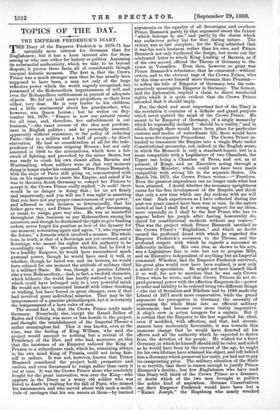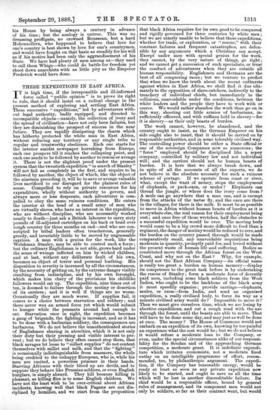TOPICS OF THE DAY.
THE EMPEROR FREDERICK'S DIARY.
THE Diary of the Emperor Frederick in 1870-71 has naturally more interest for Germans than for Englishmen; but -it has a keen interest also for those among us who care either for history or politics. Assuming its substantial authenticity, which we take to be beyond dispute, it proves three facts, all of considerable though unequal historic moment. The first is, that the Crown Prince was a much stronger man than he has usually been supposed to have been, a man not only of the large reflective power which the world vaguely recognised, but possessed of the Hohenzollern imperiousness of will, and even the Hohenzollern ruthlessness in pursuit of adequate objects. He did not hold men's prejudices, or their lives either, very dear. He is very tender to his children, and a little sentimental about his grandmother, who, however, was Queen Louisa ; but he writes on Sep- tember 8th, 1870: " France is now our natural enemy for all time, and, therefore, her enfeeblement is our business,"—the exact reverse of the idea now predomi- nant in English politics ; and he personally assented, apparently without resistance, to the policy of reducing Paris—that is, a million and a half of people—by direct starvation. He had no consideration at all for the inde- pendence of the German reigning Houses ; but not only assented in 1866 to the annexations, which were a fair result of fighting, and provoked by the minor States, but was ready to crush his own closest allies, Bavaria and Wurtemburg, whose soldiers were at that very moment dying in heaps under his command. When Prince Bismarck, with the siege of Paris still going on, remonstrated with him on his eagerness to create the Empire, and asked if he was to threaten South Germany to compel her Princes to accept it, the Crown Prince coolly replied, "Ja wohl! there would be no danger in doing that ; let us act firmly and imperiously, and you will see I was right in asserting that you have not any proper consciousness of your power," and adhered to this decision so determinedly, that his father gave way ; and Prince Bismarck, after threatening, as usual, to resign, gave way also. He was as masterful throughout this business as any Hohenzollern among his ancestors, and though he disclaimed the right to give binding orders, never forgot his position as heir of the dynasty for one moment, reiterating again and again, " I, who represent the future," a formula which involved a menace. His whole tone, in truth, is that of a Sovereign not yet crowned, and a Sovereign who meant his rights and his authority to be exceedingly real. We question whether, had he lived to be a healthy Emperor, he would have surrendered much personal power, though he would have used it well, or whether, though he hated war and its horrors, he would have relaxed for one moment the attitude of military chief in a military State. He was, though a genuine Liberal, also a true Hohenzollern,—had, in fact, a twofold character, which hitherto the world has hardly realised in him, and which could have belonged only to a very powerful mind. He would not have contented. himself with either thinking or wishing, but have forced on great changes, even if they had involved great individual miseries. That may be the temperament of a genuine philanthropist, but it is certainly the temperament of a born ruler of men. The second fact is, that the Crown Prince really made Germany. Everybody else, except the Grand Dukes of Baden and Coburg, was more or less hostile to the project, and thought the establishment of the Imperial Throne a rather meaningless fad. This it was blown, even at the time, was the feeling of King William, who said the project would amount to nothing but a revival of the Presidency of the Diet, and who had, moreover, an idea that the existence of an Emperor reduced the King of Prussia to a subordinate rank, which he, remaining always in his own mind King of Prussia, could not bring him- self to endure. It was not, however, known that Prince Bismarck considered the project both premature and useless, and even threatened to resign rather than carry it out at once. It was the Crown Prince alone who resolutely fought for the great innovation, won over the King—who appears in the Diary as a weary old Soldier who was bored to death by waiting for the fall of Paris, who missed his amusements, and who moved about with such a multi- tude of carriages that his son sneers at them—by learned arguments on the equality of all Sovereigns, and overbore Prince Bismarck partly by that argument about the future " which belongs to me," and partly by the charm which any audacious policy has for that daring nature. The victory was at last complete ; for the King admitted that it was his son's business rather than his own, and Prince Bismarck not only furthered the design, but wrote out the celebrated letter in which King Ludwig of Bavaria, as if of his own accord, offered the Throne of Germany to the victor at Versailles. Even then, however; so great was Prince Bismarck's reluctance, that he consented—without orders, and to the obvious rage of the Crown Prince, who by this time avows himself more German than Prussian— to soften the title of Emperor of Germany into the com- paratively meaningless_ Emperor in Germany The former, said the diplomatist, implied a claim to direct territorial rights, which it is quite evident that the Crown Priice intended that it should imply.
For, the third and most important fact of the Diary is the revelation it contains of a definite and grand purpose which never quitted the mind of the Crown Prince. He meant to be Emperor of Germany, of a single monarchy which he repeatedly declared " should be a reality," and in which, though there would have been place for particular customs and modes of subordinate life, there would have been none for separate Princedoms. The Crown Prince in- tended to transmute the Empire into a single State under Constitutional monarchy, not, indeed, in the English sense, in which the Monarch is only a standard-bearer, but in a sense compatible with a Legislature of two Chambers, the Upper one being a Chamber of Peers, and not, as at present, of Kings, and an Executive acting through a responsible Ministry, which could. not have been made compatible with strong life in the separate States. On March 7th, 1871, the Crown Prince writes :—" Ferrieres. Even the greatest imprudence can no longer undo what has been attained. I doubt whether the necessary uprightness exists for the free development of the Empire, and think that only a new time which one day reckons with me will see that. Such experiences as I have collected during the past ten years cannot have been won in vain. In the nation united at last I shall find a strong support for my ideas, more especially as I shall be the first Prince who has to appear before his people after having honourably de- clared for constitutional methods without any reserve." This was the project which Prince Bismarck ascribed to the Crown Prince's " Englishism," and which no doubt caused the profound dread with which regarded the Emperor Frederick's accession to the Throne, and the profound. respect with which he regards a successor so differently inclined. His own idea, as shown in his acts, was a Legislature free to veto but not to propose Bills, and an Executive independent of anything but an Imperial command. Whether, had the Emperor Frederick survived, his great plan would ever have been realised, is now only a matter of speculation. He might not have himself liked it so well, for not to mention that he was only Crown Prince when he wrote, and that Crown Princes do not re- gard personal power with the affection Emperors do—power to order and liability to be ordered being two different things —the rise of Socialism and Nihilism had by 1888 made the Liberal of 1871 much more conservative, while the grand argument for prerogative in Germany, the necessity of organising the whole State into an efficient military instrument, had become even more visibly imperative. A ship's crew in action hungers for a captain. But it is certain that the Emperor to the last regarded. his ideal, even if modified, with affection, and that, had circum- stances been moderately favourable, it was towards this immense change that he would have directed. all his efforts and all the authority which he expected to derive from the devotion of his people. He wished for a freer Germany, in which he himself should still be ruler, and aided as he would have been by the current of the age, he might for his own lifetime have attained his object, and left behind him a Germany which preserved her unity, yet had not to pay its exasperating price. The military situation of the State is so terrible, that there is reason enough to justify Prince Bismarck's doubts ; but few Englishmen who have read this Diary will think of the Crown Prince as a dreamer, or doubt which of the two men brought to politics the nobler kind of aspiration. German Conservatives say their Emperor Frederick would have been but a. "kaiser Joseph," the Hapsburg who nearly wrecked his House by being always a century in advance of his time; but the analogy is untrue. This was no dreaming profligate, no crowned Rousseau, but a hard Hohenzollern, who happened to believe that love for one's country is best shown by love for one's countrymen, and would have fought on that basis as steadily for his will as if his motive had been only the aggrandisement of his State. We have had plenty of men among us—they used to call them Whigs—who could do battle for freedom yet shoot down anarchists with as little pity as the Emperor Frederick would have done.







































 Previous page
Previous page